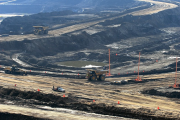In the past 18 months, critics of the Pembina Institute have made several attempts to malign our reputation as Canada’s leading clean energy think-tank by misrepresenting our work and our revenue sources.
Unfortunately, Barry Cooper’s column in the Calgary Herald this week continues that effort, repurposing arguments about Pembina made by Vivian Krause and SunMedia’s Ezra Levant — dogmatic critics of Pembina’s work and the environmental sector more broadly — without first checking his facts. As a result, Cooper’s piece perpetuates many inaccuracies we have already addressed on the record.
Born and bred in rural Alberta, Pembina has worked collaboratively with industry to find solutions for environmental challenges in energy development for more than 25 years. We have long recognized the economic significance of the oilsands, while strongly advocating that it is in our best economic and environmental interests to begin the transition to a clean energy future.
As a think-tank, we also value the wide range of perspectives on energy development, and we see debate and disagreement as both constructive and essential to fostering a robust public conversation about Canada’s energy future.
Setting aside some facts I dispute in Cooper’s column, let’s look at the substance of his argument. The hypothesis that Cooper is advancing — that funders outside Canada dictate our perspectives on energy development — is completely unfounded. Rather, Pembina begins by identifying the research and analysis that is needed to inform the public debate and good governance of Canada’s energy resources. Then we seek funding to carry out that work.
Sometimes we are successful; often we’re not. We regularly have consulting proposals rejected because of our critical stance on the impacts of energy development. We also get rejected by Canadian and international foundations because our perspective on the environmental impacts of resource development is “too soft.”
Unlike Cooper’s cartoonish worldview in which people must be either completely for or against the oilsands, we happily operate in the middle ground that acknowledges oilsands development needs to be responsible and works to advance solutions to these issues. We don’t think it is controversial to expect governments to follow through on their stated commitment to protect the environment, nor to expect companies to meet rules that are already in place. We produce research, analysis and commentary that is well informed, constructive and fair, and advance solutions to the environmental challenges industry faces.
At the heart of Cooper’s criticism is the assumption that Pembina is willing to adjust our policy perspectives and activities to advance positions that we do not actually support. If we were willing to do this, our operating budget would no doubt double or triple in size.
Nonetheless, Pembina has cultivated a diverse revenue base that ensures we are not beholden to any single entity.
Yes, as Cooper points out, the Tides Foundation is one funder who supports our efforts to advocate for stronger regulations to manage the environmental impacts of oilsands development. That funding is allocated to projects — proposed and developed autonomously by Pembina staff — that aim to ground public debate and policy development in the scientific evidence about the current and future impacts of oilsands expansion.
In contrast, the federal government is spending $40 million this year alone to promote Canada as a “secure and responsible” source of oil, even as they continue to delay the release of regulations to address emissions from the oil and gas sector and despite the government’s comprehensive weakening of environmental laws.
Pembina’s funding is a drop in the bucket by comparison, but it enables us to push for more effective environmental management in the oilsands. This would not only be in the best interests of Albertans, but would also benefit the energy sector by creating regulatory certainty, increasing competitiveness, and reducing market barriers.
Had Cooper actually been interested in getting a more accurate picture of our revenue sources, our work with various municipalities including the City of Calgary, or other clients prior to publishing his column, he could have found that information presented transparently and in detail on our website.
It’s an unfortunate and unproductive indicator of how polarized the national conversation around energy and the environment has become when a pragmatic, research-focused group like Pembina can be painted as “anti-oil” or “working for the Americans.”
Alberta’s customers take our environmental performance seriously. As Albertans, it’s time to turn our full attention back to the business of improving it. There is much work to be done in 2014.





